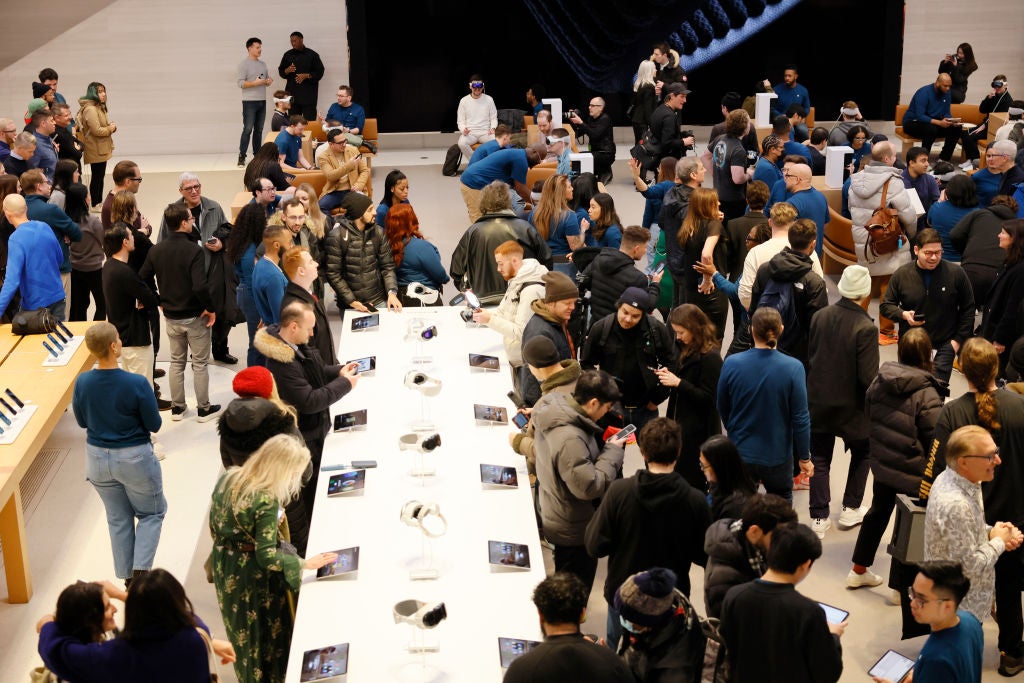
Alongside our daily news coverage, features and interviews, Verdict’s news team sifts through the week’s most intriguing data sets to bring you a round-up of the week in numbers.
This week, we took a look at the decline in VR/AR deals after the much anticipated US release of Apple’s Vision Pro, examined China’s video game market after Tencent announced that it is struggling to compete against its rivals, and looked deeper into the semiconductor arms race between the US and China.
Apple Vision Pro launches in US
Apple’s long-awaited augmented reality (AR) headset, the Vision Pro, was finally released in the US on 2 February.
The iPhone maker claims the release marks a turning point for virtual reality (VR) technology, which has failed to become widespread since its inception in 2013.
Much like the launch of the iPhone, the Apple Vision Pro’s release has been accompanied by hype. Video clips of enthusiasts wearing the Vision Pro on the subway and in Times Square have gone viral this week.
The headset, which retails at $3,499, has been marketed by Apple as a multipurpose device that works differently to every other AR headset on the market.
However, as YouTube reviewer Marques Brownlee puts it, it is effectively a really high-end VR headset with some never-before-seen technology built in.
Competitors to Apple’s new offering include Meta’s Quest Pro and Sony’s PlayStation VR 2, all of which have not saved the VR/AR industry from consistent decline in the past few years.
VR/AR deals in the US totalled $750m across 70 deals in 2021, according to GlobalData's deal database.
In 2022, deals in the VR/AR market showed a significant drop, totalling just $573m across 60 deals.
This dropped again in 2023, with deals across the VR/AR market totalling $313m across just 35 different deals.
GlobalData predicts Nvidia will lose dominance in 2024
Verdict reported this week that research company GlobalData predicts Nvidia will become a less dominant force in the semiconductor industry in 2024.
US chip giant Nvidia joined the one-trillion-dollar club of companies in 2023, bolstered by the huge demand for its H100 Graphics processing units (GPUs), an essential part of the modern AI infrastructure.
According to GlobalData’s report, 2024 Enterprise Predictions: Artificial Intelligence, Nvidia will become less of a dominant force in the AI chip industry due to rising competition in the sector.
“As companies of all sizes work to reduce their dependence of Nvidia, alternative chip architectures will grow stronger, with CPUs, ASIC chips, and other designs gaining more ground,” the report stated.
In 2024, the US government will further weaponise its chip technology intellectual property (IP) through regulations restricting chip technology exportation, which GlobalData predicts will hurt technology companies like Nvidia.
As much as 30% of the US chip industry relies on sales to Chinese clients, according to GlobalData, which further indicates the strain that will be placed on Nvidia.
The value of semiconductor deals in the US and China have both seen a decline as a result of tightening US restrictions, COVID-19 and an uncertain economic market.
In 2020, the value of semiconductor deals in the US totalled $132bn, significantly more than China which saw a total value of $36bn.
In 2022, the value of semiconductor deals in the US had dropped to $108bn, while the value of deals in China had suffered less of a drop to $30bn.
The US and China saw another drop in semiconductor deal value in 2023. The total value of deals in the US totalled $56bn, while the value of deals in China totalled $16bn, closing the gap further between the two countries.
Tencent continues to struggle in mobile game market
Tencent has been struggling to compete with rivals in its mobile gaming unit, which was amplified this week by the scrapping of its anticipated mobile game based on Square Enix's Nier franchise.
Tencent, which gets 30% of its revenue from gaming, has had its recent releases fall short of expectations, CEO and co-founder, Pony Ma said in January.
The company’s rivals have had more success with their recent releases, such as miHoYo with Genshin Impact and NetEase with Eggy Party.
Despite China's domestic gaming revenue returning to growth in 2023, reaching $42bn (298.68bn yuan) for the first time, venture financing deals in China's video game market have been on a downward trajectory.
Declining venture financing deals in the industry are likely from China's eight-month crackdown on gaming two years ago, making the market a risky area for investors.
In 2023, the value of venture financing deals in China totalled just $24m, according to GlobalData's deal database.
This was a significant decrease from 2021, which saw deals total $577m.
Motorola and Google partner on safety and security
Verdict reported this week that Motorola Solutions and Google Cloud announced a multi-year collaboration aimed at advancing cloud solutions within Motorola Solutions’ safety and security technologies.
The partnership will see UK-based Motorola use Google Cloud’s infrastructure to develop assistive intelligence, video content delivery, mapping, and AI capabilities, addressing real-world safety challenges.
Motorola Solutions and Google Cloud also aims to improve safety and security processes.
The news comes as the UK continues to significantly fall behind in the amount of patents filed in the cloud and cybersecurity space, according to GlobalData's patent publication database.
In 2023, the volume of patents in the UK totalled 1,176, significantly lower than the US which saw 52,628 patents filed. China continued to lead globally with 67,503 patents filed in 2023.
The UK filed slightly more patents than last year in 2022 with a total of 1,656. The US also filed slightly more with 54,649. China filed significantly more in 2022 than last year, with a total of 81,605.
GlobalData forecasts that cybersecurity revenues will reach $344bn worldwide by 2030.







